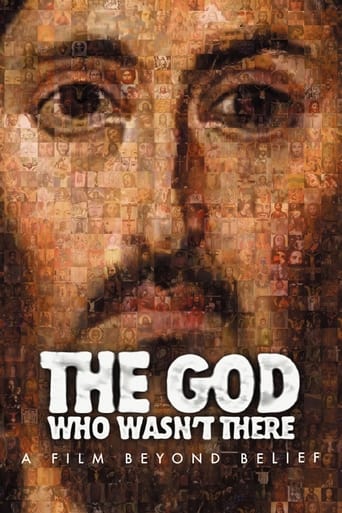

Great Film overall
... View MoreNot sure how, but this is easily one of the best movies all summer. Multiple levels of funny, never takes itself seriously, super colorful, and creative.
... View MoreIt's easily one of the freshest, sharpest and most enjoyable films of this year.
... View MoreVery good movie overall, highly recommended. Most of the negative reviews don't have any merit and are all pollitically based. Give this movie a chance at least, and it might give you a different perspective.
... View MoreThere are a lot of people out here who believe a lot of things, I am continually amazed by these videos, where the filmmaker is determined to show us how smart he is and how stupid everyone else is. Well, it really didn't work this time.I appreciate that Brian Flemming feels some sort of loss at having a "Christian Education" that was flawed. But seriously putting Charles Manson out there as a representative of the Christian Faith...and, trying to corner the Dean or Principal of the his former school--Epic Fail. Again, there are enough people out there that would gladly enter the debate--no need to blindside people.
... View MoreI'm a Christian. I'm also extremely open-minded and a logical thinker. Yea, I know we all consider ourselves to be this way, but I've had more than one close friend say that I'm the most level headed person they know. They say I am willing to see things from another person's viewpoint better than anyone they know. When presented with an argument that contradicts my opinion or my belief, I pride myself in being able to consider the other person's position...that is, as long as they are willing to discuss the matter in an intelligent, civil manner. Brian Williams cannot do this.I had been debating internally whether or not to watch the movie. Not because I was afraid my faith would be shaken, but because I didn't know if I wanted to spend 90 minutes of my life listening to something that might be someone else's ludicrous argument. For example, I had seen Bill Maher's "Religuous" and it was full of asinine statements. He interviewed people who were just ordinary folks or fringe believers, and he mocked them. He didn't have the guts to debate experts who have studied the religion. The priest of my local parish would have ripped Maher to shreds in a debate over religion.So, I took a chance and started the movie. Right off the bat Williams starts with poor logic then he insults me. The movie starts out saying the church once believed the Sun revolved around the Earth. Since they were wrong about that could they be wrong about other things? This is poor logic because nowhere in our dogma does it say that salvation required a follower to believe the Sun revolved around the Earth. Human's lack of understanding of the mechanics of the universe, and their insistence on adhering to a false understanding of those mechanics, doesn't prove or disprove the existence of God, either.Williams then immediately jumped into a series of short quips of Christians explaining who Jesus was (i.e. "the Son of God" or "the Messiah, the Saviour of the World"). Williams narration points out that these Christians are smiley, happy people, but not all Christians are like them. He then starts rolling a series of pictures of deranged people who have committed horrific acts in the name of God.Screw you, Williams. These people were not followers of God. They were insane. Your insinuation that Christians are evil, disturbed people or a belief in God drives people to commit atrocious acts is insulting to me. Because of the nature of humans there are good and bad people in EVERY aspect of life! If you want to debate the existence of Jesus, fine. If you want to do it by insulting me and my faith, then you're on your own.I turned off the movie after 3 minutes.
... View MoreI watch movies like this because I believe faith should be challenged and beliefs questioned in order for people to be certain of their convictions. I watched Flemming's film for the first time today on a movie streaming service and was sorely disappointed.The largest obvious flaw in the filmmaker's presentation is his tendency to equate the ravings of psychopaths, narcissistic iconoclasts, and violent historical acts of zealotry with "Christianity" in general when these isolated examples are not nearly representative of the faith as it is written or practiced today. One other glaring argumentative weakness includes misquoting the Bible to make a point, such as when he mistakes Apostle Paul's subjunctive mood for an outright rejection of Christ's earthly existence in Hebrews 8:4 and changes a few words accordingly (I read the passage myself as I was watching). He makes similar errors throughout the film. The people he interviews in the film who are pro- Christian are clearly not accustomed to intellectualizing Christianity while he has published scholars defending his anti-Christian viewpoint. Hardly an even match.I'm convinced that the filmmaker is more interested in promoting his personal disillusionment with Christianity than with sparking an honest discourse about the role faith plays in American culture and politics. I'm puzzled if an intelligent, informed person-- atheist, agnostic, or otherwise--would find this film to be a well crafted statement that formidably challenges Christian faith.
... View MoreThis is a documentary with a length of 52 and a half minutes sans credits(an hour and half a minute with). It consists of interviews with historians, college professors(and similar experts), as well as various random Christians, narration, and clips of films(old and new, all of them dealing with the belief, including The Torture Porn of The Christ). The subject is whether or not Jesus existed, and if he was what he is said to be, or a mere human being. That in and of itself is a worthwhile exploration, and plenty of compelling evidence is presented, and it should open many minds, since it is among the best arguments against that brand of monotheism, objectively speaking(meaning, outside of the ethical ones). However, perhaps on account of his own past fundamentalism within it, director Brian Flemming doesn't stop there, and makes numerous digressions, of varying credibility and maturity(sadly reflecting negatively on the main idea of this, which, again, ought to be shared and spread), such as when he exhibits the need to contrast people happy when explaining the life and application of their saviour with detailing some of the horrors committed in his name. While it's fine to discuss the latter, that's not particularly what's done here, it's used for shock value and almost as if the man helming this production can't say something positive about the other side without also saying something awful, and with a distinct sense of him needing to convince himself(more so than us) that it's a good thing he abandoned his faith. This is something that one gets past later in their atheism(or new supernatural concept), and I get the impression that he should simply have made this later(Richard Dawkins, he is not). This does take a look(or rather a glance) at the evils inspired by(or otherwise linked to) religion, but it is fairly superficial and one-sided, more intent to point fingers than examine(you'll note that Sam Harris is one of those talked to). It is telling that he takes us to the school he went to, confronting its leader, and as important as it is to fight indoctrination, you can't shake the feeling that he's getting payback(pulling him down from the moral high ground). All in all, however, this is good(and it could have been even better). I recommend it to anyone who wants to know more about this(and as usual, research it yourself as well... don't take someone else's word for it). 7/10
... View More